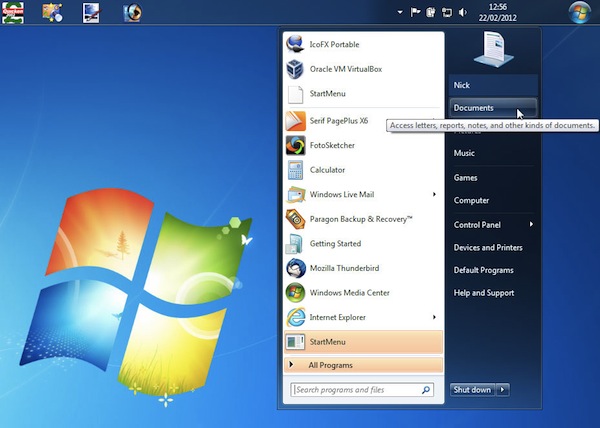
Technology is becoming something of a fight club, as competitors (and some partners) beat up one another over intellectual property rights. Apple sues seemingly everyone, while Microsoft collects royalties from most Android licensees. Motorola, holder of 17,000 patents with about 7,000 more pending, joins the foray, too, and Microsoft is big-time pushing back.
In a week where Microsoft accused Google of circumventing Internet Explorer privacy settings and posted the demeaning "Googlighting" video comes another slap down: The software giant filed antitrust complaints in Europe against Motorola and new owner Google.
Microsoft claims that Motorola demands high licensing fees for video patents and seeks to block Windows and Xbox sales without payment. It's allegedly high-stakes extortion, a series of low blows that has Microsoft calling on the referee to step into the fight.
Simply stated: To participate in technology standards, patent holders agree to license on "reasonable and non-discriminatory terms", better known simply as RAND here and FRAND in Europe, adding word "fair". These cover what are typically called "standard essential patents" that are broadly adopted and necessary, meaning certain products require them. Microsoft claims there's nothing fair, reasonable or non-discriminatory about Motorola licensing fees.
FRAND removes monopoly advantage over patents used in industry standards, which is major reason why it can be an antitrust matter when any IP holder demands onerous licensing terms or otherwise interferes with competition.
Microsoft filed the complaint with the European Union's Competition Commission, which also is investigating Samsung for abusing 3G FRAND patents. In separate statements, Google and Motorola said they had not yet seen the complaints.
Fist-Fighting
The underlying issues are more complex than just FRAND. Microsoft and Motorola already were locked in a legal row. In October, Microsoft filed an infringement claim alleging that Motorola violated patents related to Android. In December, the US International Trade Commission found that Motorola had violated one of seven Microsoft patents.
A month earlier, Microsoft filed a lawsuit accusing Motorola of demanding exorbitant licensing fees for FRAND video and WiFi patents. Today's antitrust complaint extends Microsoft's legal fight over them.
The question: What's fair and reasonable? Microsoft has an answer. "Motorola is demanding that Microsoft pay a royalty of $22.50 for its 50 patents on the video standard, called H.264", Dave Heiner, Microsoft deputy general counsel, asserts.
"As it turns out, there are at least 2,300 other patents needed to implement this standard. They are available from a group of 29 companies that came together to offer their H.264 patents to the industry on FRAND terms. Microsoft’s patent royalty to this group on that $1,000 laptop? Two cents".
Heiner gunned for Microsoft's search rival in corporate blog post "Google: Please Don't Kill Video on the Web". I couldn't have written a better title, and BetaNews readers often comment about my baiting headlines.
He continues: "For a $2,000 laptop, Motorola is demanding double the royalty -- $45. Windows is the same on both laptops, and so is the video support in Windows. But the high-end laptop will have a bigger hard drive, more memory, perhaps a titanium case -- and Motorola is demanding a hefty royalty on all of this, even though none of these features implements Motorola’s video patents".
Heiner's post is rich with rhetoric, which I chose not to sample. The tone rings similar to other recent attacks against Google and ignores Microsoft's own aggressive, competitive licensing tactics; there Android licensees stand tall among them. Microsoft now collects patent fees from most manufacturers making Android handsets, with Motorola being major exception.
Under New Management
Detente defines FRAND, or did until the recent patent fighting over mobile devices and Google's acquisition of a large patent horde. In putting up its "change of management" sign, Google's position on standard essential patents and FRAND causes concern everywhere. For example, European and US regulators approved Google's Motorola merger but with caveats.
Earlier this month, the US Justice Department explains its reasons for approving the Google-Motorola merger and sale of other patents to Apple and Microsoft, among others.
"Motorola Mobility has had a long and aggressive history of seeking to capitalize on its intellectual property and has been engaged in extended disputes with Apple, Microsoft and others", the Justice Department's letter explains. "Google’s acquisition of Motorola Mobility is unlikely to materially alter that policy".
In approving three deals, trustbusters looked at possible abuse of standard essential patents. Apple and Microsoft assurances placated Justice Department lawyers, but not Google's.
In a November letter to European competition authorities, Apple assured that: "A party who made a FRAND commitment to license its cellular standards essential patents or otherwise acquired assets/rights from a party who made the FRAND commitment must not seek injunctive relief on such patents. Seeking an injunction would be a violation of the party’s commitment to FRAND licensing".
In a notice posted this month, Microsoft takes a clearer position:
Microsoft’s approach is straight-forward:
1. Microsoft will always adhere to the promises it has made to standards organizations to make its standard essential patents available on fair, reasonable and nondiscriminatory terms.
2. This means that Microsoft will not seek an injunction or exclusion order against any firm on the basis of those essential patents.
3. This also means that Microsoft will make those essential patents available for license to other firms without requiring that those firms license their patents back to Microsoft, except for any patents they have that are essential to the same industry standard.
4. Microsoft will not transfer those standard essential patents to any other firm unless that firm agrees to adhere to the points outlined above.
By comparison, as the Justice Department observes, "Google’s commitments were more ambiguous and do not provide the same direct confirmation of its SEP licensing policies".
Google also didn't preclude seeking injunctions over standard essential licenses. "Google reserves its rights to seek any and all judicial remedies against counterparties that refuse a RAND license or subsequently breach any of their commitments on the terms of any license agreement covering the acquired [Motorola Mobility] Essential Patent Claims or the counterparty's Essential Patent Claims", according to a letter sent to IEEE earlier this month. Additionally, Google plans to seek patent cross-licensing agreements in some cases.
"Google’s statement therefore does not directly provide the same assurance as the other companies’ statements concerning the exercise of its newly acquired patent rights", the Justice Department warns. "Nonetheless, the division determined that the acquisition of the patents by Google did not substantially lessen competition, but how Google may exercise its patents in the future remains a significant concern".
Problem: No company's public position can truly be trusted since all have vested and often conflicting interests in the outcomes and there is so much money at stake. For example, Google has forsworn H.264 for open-source WebM. Onerous license terms could be used to dissuade other companies from licensing the video codec. Meanwhile, Microsoft is unlikely to embrace WebM by choice.
Photo Credit: Nicholas Piccillo/Shutterstock



 There is some truth to Microsoft's "Googlighting" video -- that somehow every Google product feels like a work unfinished. Good Example: Google Docs for Android, which today got some features that should have been there in the first place. Collaboration is one of Google Docs headline features. But that feature lacked for something on Android phones or tablets. Today's update essentially brings more parity between the desktop and mobile clients.
There is some truth to Microsoft's "Googlighting" video -- that somehow every Google product feels like a work unfinished. Good Example: Google Docs for Android, which today got some features that should have been there in the first place. Collaboration is one of Google Docs headline features. But that feature lacked for something on Android phones or tablets. Today's update essentially brings more parity between the desktop and mobile clients.




 Flash is dead. Well, maybe that wording is a bit strong, but Adobe's
Flash is dead. Well, maybe that wording is a bit strong, but Adobe's  Verizon Wireless customers coast to coast are taking to social media and the company's
Verizon Wireless customers coast to coast are taking to social media and the company's  Next week, at the GSMA Mobile World Congress, Mozilla will be launching its own app store for HTML5 web apps, called the Mozilla Marketplace, much like Google did with the Chrome app store that launched worldwide
Next week, at the GSMA Mobile World Congress, Mozilla will be launching its own app store for HTML5 web apps, called the Mozilla Marketplace, much like Google did with the Chrome app store that launched worldwide